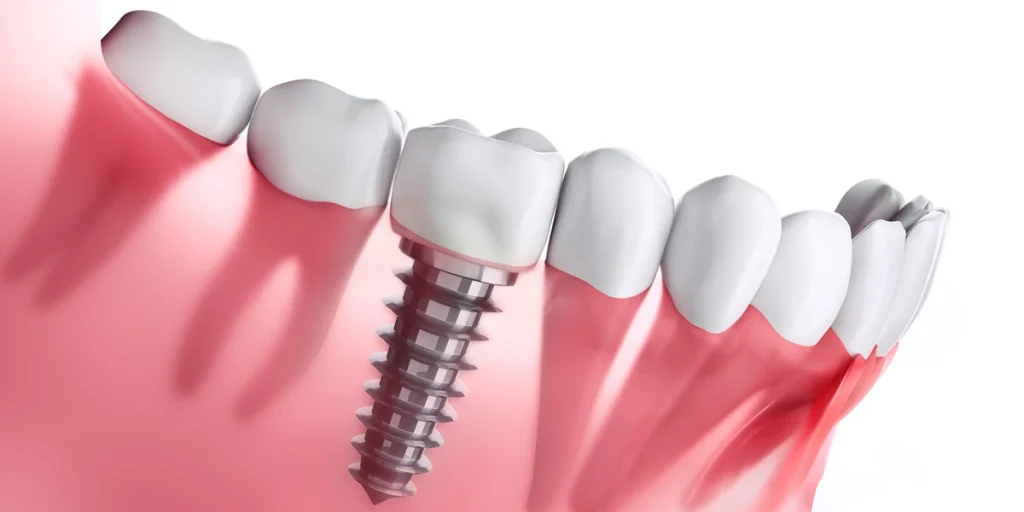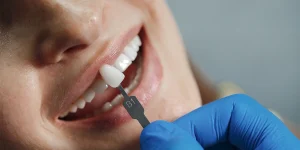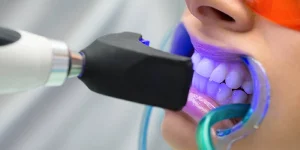The dental implant healing time marks the period from your dental implant procedure to the implant’s full fusion with the jawbone. This guide outlines each crucial stage to manage your recovery time from dental implants.
Bone fusion requires 3 to 6 months for woven bone to mature, ensuring the implant’s strength. A 20-year meta-analysis in Clinical Oral Investigations affirms remarkable long-term success, stressing the need for continued follow-up.
Learn what to expect and how long does it takes for dental implants to heal, ensuring your new restoration achieves lasting success.
[toc]
The Critical Start: Immediate Stage (24 to 72 Hours)
The initial 24 to 72 hours set the tone for your recovery time from dental implants. During this stage, expect some bleeding at the site, swelling, and a dull ache following the dental implant procedure.
- Rest and Elevation: Rest with your head elevated to minimize swelling.
- Swelling Control: Apply cold packs for 10 to 15 minutes at a time.
- Medication: Take prescribed pain relievers and antibiotics exactly as directed.
- Clot Protection: Avoid rinsing, spitting, or using a straw for 24 hours to protect the vital blood clot.
- Gentle Rinse: After the first day, rinse gently with salt water three times daily.
These precise actions reduce complications and keep the wound clean while soft tissue begins to close.
Short-Term Progress: (1 to 2 Weeks)
Over the next one to two weeks, swelling significantly eases, and the soft tissue surrounding the surgical area continues to heal. This period is key to maintaining progress in your dental implant healing time.
- Diet: Continue a soft diet, focusing on soups, mashed vegetables, and soft pasta.
- Hygiene: Brush non-surgical teeth normally, but clean very gently around the surgical site to avoid disturbing the area.
- Sutures: Sutures typically dissolve or are removed near the end of the first week.
- Lifestyle: Strict avoidance of smoking and heavy alcohol is crucial; both dramatically slow healing and increase infection risk.
- Activity: Most individuals return to light activity within a few days and normal routines by the end of two weeks, unless specifically advised otherwise by your surgeon.
Mid-Stage Fusion: (3 to 8 Weeks)
From the third week, the critical process of osseointegration begins, where new bone forms around the implant surface. This phase is vital for the genuine dental implants recovery time.
- Diet Progression: Gradually introduce firmer foods, but continue to avoid hard or crunchy chewing directly over the implant area.
- Hygiene Detail: Maintain rigorous oral hygiene, incorporating interdental brushes or a water flosser to remove plaque, especially important if you have full mouth implants.
- Follow-up: Attend all scheduled visits so your clinician can assess tissue health and monitor the early bone response.
- Monitoring: Minor tenderness is normal. However, persistent pain, fever, or any discharge requires prompt review, as these are not typical signs of healthy recovery.
Full Dental Implant Healing Time (3 to 6 Months)
Osseointegration, the biological fusion of the titanium post and bone, typically completes within three to six months. This period ensures the implant gains the necessary stability to safely support a permanent crown or fixed prosthesis, marking the final stage of your dental implant healing time.
- Avoid Heavy Loading: Do not place heavy chewing force on the implant until your clinician places the final crown.
- Maintenance: Maintain excellent hygiene and keep up with professional cleanings every three to six months.
- Healing Variables: If your initial dental implant procedure included bone grafting, the full integration may extend past six months.
- Final Step: For most patients, the final restoration arrives at month three to six, completing the dental implants procedure and restoring full function.
Full Mouth Implants and All-on-4: Managing Recovery Time
Full mouth implants follow the same biological timetable as single implants, but clinicians plan differently to protect the healing bone and soft tissue.
- All-on-4 Protocols: These protocols place four to six implants per arch, often delivering provisional teeth the same day of the dental implants procedure.
- Load Management: Clinicians carefully manage load and adjust the provisional prostheses to strictly avoid overloading the implants while osseointegration occurs.
- Healing Span: Despite immediate provisionalization, expect a similar three to six-month integration period for the implants before the final prostheses are placed.
- Patient Experience: Patients receiving full mouth implants face a more intense early recovery, yet modern protocols balance this with the benefit of fewer surgical visits overall.
What to Do For the Dental Implants To Heal Faster
To optimize your dental implant healing time and encourage successful osseointegration, focus on these critical lifestyle and health management steps:
- Quit Smoking: Smoking dramatically increases the risk of implant failure; cessation before and after the dental implant procedure is non-negotiable.
- Manage Health: Effectively control chronic conditions like diabetes and strictly follow your physician’s advice to support optimal healing.
- Nutrition: Consume nutrient-rich foods that actively support bone health, prioritizing protein, calcium, and Vitamin D.
- Follow-Up: Keep all scheduled follow-up appointments and raise any concerns immediately. Early intervention prevents small problems from becoming significant failures, safeguarding your recovery time from dental implants.
Frequently Asked Questions
Does grafting lengthen healing time?
Yes. Bone grafts add healing time because the graft needs to integrate before the implant can bear full load. Expect an extended timeline, around 4 to 6 months or longer, depending on graft size, material, and your health. Grafting improves long-term stability, so the extra time helps ensure the implant succeeds.
When should I worry about recovery?
Call your dentist for severe pain, fever(OVER 101F), heavy bleeding, or any sudden loosening.
How long does it take for dental implants to heal?
Bone fusion requires 3 to 6 months for woven bone to mature, ensuring the implant’s strength. A 20-year meta-analysis in Clinical Oral Investigations affirms remarkable long-term success, stressing the need for continued follow-up.
Ready to Map Your Dental Implant Healing Time Timeline?
How long does it take for dental implants to heal? Expect comfort in days, tissue repair in weeks, and full bone fusion in 3 to 6 months in most cases. Your exact timeline depends on bone health, whether grafting was needed, and your overall health.
Want a timeline tailored to your case? Book a consult so we can review imaging, plan the dental implants procedure, and map a recovery schedule that fits your health and goals.




